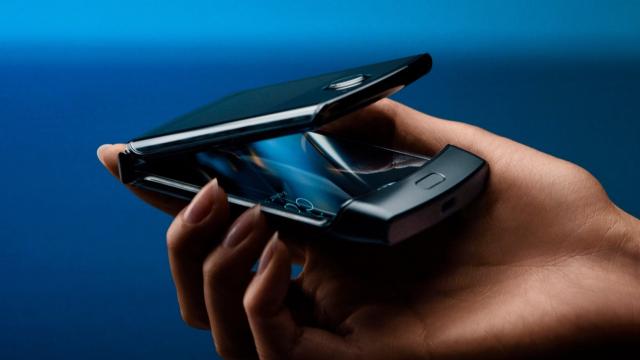Motorola is bringing the flip phone back, baby: On Wednesday, Verizon announced the debut of a new Razr phone with a 6.2-inch foldable display that flips to half size. (But not before a day of leaks.)
According to a Verizon press release, the new Motorola Razr will clock in at the eye-popping price of $US1,500 retail (still less than foldable competitors Samsung Galaxy Fold at $2,999 or more and Huawei Mate X at $US2,420). Its 6.2-inch screen is ultrawide and the device packs a 16-megapixel main camera; Verizon added that when folded, the Razr’s “touchscreen Quick View external display lets you respond to notifications, take selfies, play your music, use Google Assistant, and more without having to flip open your phone.”
Slashgear has some more details on the device, including that the main display is a pOLED running at 2142 x 876 resolution while the Quick View display is a 2.7-inch OLED running at 600 x 800. Replying to text messages and emails via the external display requires using smart replies or dictation, though it will also function as a music controller and preview screen for the camera. It also has a Snapdragon 710 processor, 6GB of memory, and 128GB of storage, running Android Pie 9.
Downsides noted by Slashgear include no wireless charging and fast charging that caps out at 15W, as well as a 2,510 mAh battery. That’s considerably lower than the 3,000 mAh battery in Samsung’s flagship Galaxy S10 and newer iPhones, most models of which come in closer to or slightly over 3,000 mAh. Additionally, the new Razr follows other manufacturers’ leads by ditching the 3.5mm headphone jack for a USB-C connector, a decision widely reviled by consumers used to simply plugging in whatever headphones they have available at the moment. And despite Verizon’s big talk about their 5G network, the Razr will cap out at current-gen 4G LTE speeds.
The new @Moto Razr has some pretty cool hinge engineering that allows the screen to fold, but not crease. It also folds out completely flat and solid. Check out @jdolcourt‘s hands-on!https://t.co/F4oDeMDfQg pic.twitter.com/NJlInvuRy2
— James Martin ???? (@Jamesco) November 14, 2019
Motorola Razr, the reboot. pic.twitter.com/hVnb6g64WX
— Caitlin McGarry (@Caitlin_McGarry) November 14, 2019
Notably, this device looks much more practical (at face value) than either the Galaxy Fold or Mate X, both of which are more like foldable tablets. This is also another step forward for foldable devices entering the mainstream—assuming that Motorola doesn’t run into the same technical issues plaguing initial versions of the Galaxy Fold. If all goes well, which is far from guaranteed, early adopters considering acting as de facto beta testers may opt for this over their pricier competitors. Motorola also has the nostalgia factor working on their side.
